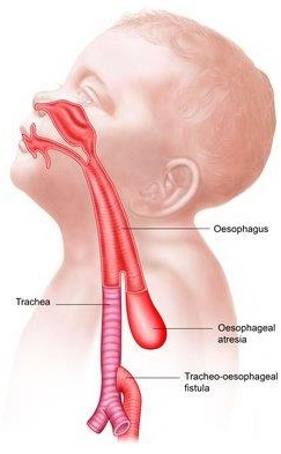The nurse is caring for a neonate with a suspected tracheoesophageal fistula (TEF). Nursing care should include which of the following?
Elevating the head but give nothing by mouth
Elevating the head for feedings
Avoiding suction unless infant is cyanotic
Feeding glucose water only
The Correct Answer is A
When caring for a neonate with a suspected tracheoesophageal fistula (TEF), nursing care should include elevating the head but giving nothing by mouth. Tracheoesophageal fistula is a condition where an abnormal connection exists between the trachea and oesophagus, leading to the passage of air and secretions between these structures. Feeding the infant orally can result in aspiration of feedings into the lungs, which can cause respiratory distress and complications. Therefore, it is important to keep the neonate in an upright position to reduce the risk of aspiration until a definitive diagnosis and treatment plan are established.
elevating the head for feedings in (option B), is not appropriate in this case as oral feedings should be avoided until the tracheoesophageal fistula is addressed.
avoiding suction unless the infant is cyanotic in (option C), is not correct. Suctioning may be necessary in neonates with suspected tracheoesophageal fistula to clear secretions and maintain a patent airway.
feeding glucose water only in (option D), is not an appropriate intervention for a neonate with a suspected tracheoesophageal fistula. In this situation, all oral feedings should be withheld until further evaluation and management.

Nursing Test Bank
Naxlex Comprehensive Predictor Exams
Related Questions
Correct Answer is D
Explanation
The first sign of pubertal change seen with boys is testicular enlargement. This is known as testicular or scrotal growth and is one of the earliest physical signs of puberty in boys. Testicular enlargement is followed by other changes such as the growth of pubic hair, penile growth, voice deepening, and facial hair growth.
voice deepening in (option A) is incorrect because it, typically occurs after testicular enlargement and is associated with the growth and development of the larynx during puberty.
scrotal enlargement in (option B) is incorrect because it, may occur simultaneously or shortly after testicular enlargement as part of overall genital growth during puberty.
, facial hair growth in (option C) is incorrect because it, is a later sign of pubertal development in boys and typically occurs after the initial testicular enlargement and growth of pubic hair.
Correct Answer is C
Explanation
Hypoglycaemia is characterized by low blood sugar levels. In children, symptoms of hypoglycaemia can vary, but irritability is a common sign. Other signs and symptoms of hypoglycaemia in children may include sweating, trembling, pale skin, hunger, weakness, confusion, and dizziness.
Normal sensorium and serum glucose greater than 160 mg/dL in (Option A) is incorrect because a normal sensorium (normal level of consciousness) and a serum glucose level greater than 160 mg/dL would not be indicative of hypoglycaemia.
Urine positive for ketones and serum glucose greater than 300 mg/dL in (Option B) is incorrect because it describes characteristics of hyperglycaemia (high blood sugar levels) rather than hypoglycaemia. Positive urine ketones and a serum glucose level greater than 300 mg/dL are commonly seen in diabetic ketoacidosis, a complication of high blood sugar levels in diabetes.
Increased urination and serum glucose less than 120 mg/dL in (Option D) is incorrect because it describes increased urination and a serum glucose level less than 120 mg/dL. While a serum glucose level less than 120 mg/dL could indicate hypoglycaemia, increased urination is not a typical sign of hypoglycaemia. Increased urination may be seen in conditions such as diabetes mellitus when blood sugar levels are consistently high.
Whether you are a student looking to ace your exams or a practicing nurse seeking to enhance your expertise , our nursing education contents will empower you with the confidence and competence to make a difference in the lives of patients and become a respected leader in the healthcare field.
Visit Naxlex, invest in your future and unlock endless possibilities with our unparalleled nursing education contents today
Report Wrong Answer on the Current Question
Do you disagree with the answer? If yes, what is your expected answer? Explain.
Kindly be descriptive with the issue you are facing.
